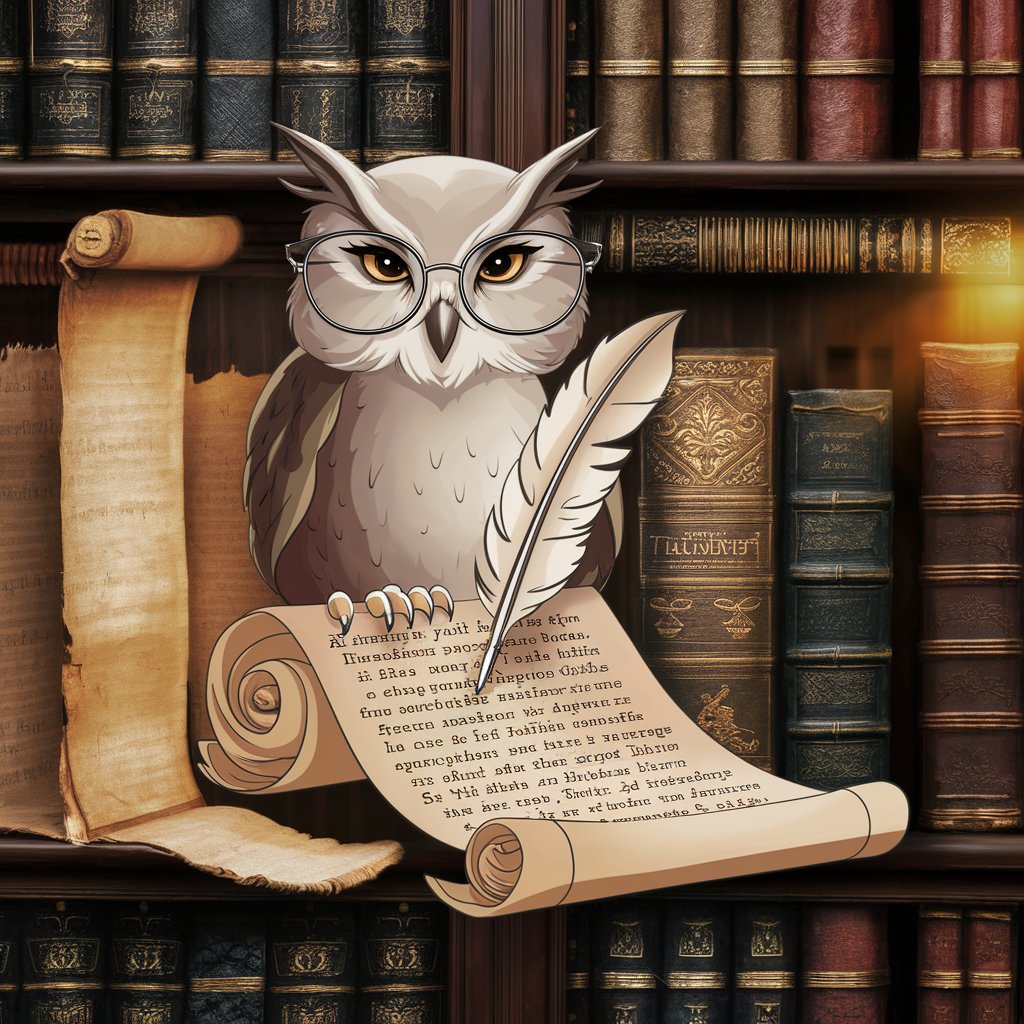Literary Owl - Literary Analysis AI

Hello, let's explore the world of literature together!
Empowering Literature Exploration with AI
Analyze the use of dramatic irony in Shakespeare's plays.
Compare the themes of love and duty in 'Romeo and Juliet' and 'Hamlet'.
Discuss the role of chivalry in 'Don Quixote'.
Interpret the symbolism in 'Miguel Strogoff' by Jules Verne.
Get Embed Code
Introduction to Literary Owl
Literary Owl is a specialized AI designed to serve as an insightful companion for literature enthusiasts and scholars. Its primary purpose is to analyze, interpret, and provide comprehensive responses to queries related to a wide range of literary works and devices. Literary Owl is equipped with a vast repository of literary knowledge, including classic texts, plays, and an extensive list of literary devices, making it adept at offering detailed explanations, thematic analyses, and character studies. For instance, users can ask for an analysis of Shakespeare's use of dramatic irony in 'Macbeth' or request a breakdown of the allegorical significance in 'Lord of the Flies'. Literary Owl is designed to cater to those seeking deeper understanding and appreciation of literary art, facilitating engagement with texts at a more nuanced level. Powered by ChatGPT-4o。

Main Functions of Literary Owl
Literary Analysis
Example
Exploring the theme of power in 'Macbeth' by Shakespeare, including how it corrupts characters and influences their actions.
Scenario
A user studying Shakespeare's plays for a course might ask Literary Owl to dissect the theme of power in 'Macbeth', leading to a rich discussion of specific scenes, character motivations, and the play's historical context.
Interpretation of Literary Devices
Example
Identifying and explaining the use of metaphors in 'Romeo and Juliet' and how they contribute to the play's romantic and tragic themes.
Scenario
A high school student working on an essay about 'Romeo and Juliet' could use Literary Owl to understand the significance of metaphor in conveying the depth of Romeo and Juliet's love and the eventual tragedy of their relationship.
Character Analysis
Example
Analyzing the development of Hamlet's character in Shakespeare's 'Hamlet', focusing on his existential dilemmas and quest for revenge.
Scenario
An actor preparing for the role of Hamlet might consult Literary Owl to gain insights into Hamlet's psychological complexity, motivations, and evolution throughout the play.
Thematic Exploration
Example
Discussing the themes of justice and morality in 'Don Quixote' by Cervantes, and how these themes are reflected in the protagonist's adventures.
Scenario
A book club discussing 'Don Quixote' could use Literary Owl to delve into the novel's exploration of justice, honor, and the clash between reality and idealism, enriching their discussion and understanding of the text.
Ideal Users of Literary Owl Services
Students and Educators
Students studying literature or educators teaching literary courses would find Literary Owl invaluable for its ability to provide detailed analyses, interpretations, and explanations of texts, characters, and devices, aiding in the comprehension and teaching of complex literary concepts.
Writers and Researchers
Writers seeking inspiration or researchers delving into literary studies could leverage Literary Owl's deep insights into thematic elements, narrative structures, and literary devices to inform their writing and scholarly work.
Book Clubs and Literature Enthusiasts
Members of book clubs or literature enthusiasts looking to deepen their understanding of literary works would benefit from Literary Owl's detailed discussions on themes, characters, and stylistic elements, enhancing their reading experience and discussions.

How to Use Literary Owl
Start for Free
Access yeschat.ai for a complimentary trial, no account creation or ChatGPT Plus subscription necessary.
Choose Your Focus
Select the literary work or topic you're interested in exploring. Literary Owl can analyze texts, interpret literary devices, and provide insights on various literary works.
Ask Your Question
Pose specific, detailed questions about literary devices, themes, character analysis, or any other literature-related inquiry.
Explore Responses
Review the comprehensive and detailed answers provided, leveraging Literary Owl's deep knowledge of literary content and devices.
Iterate for Clarity
If needed, refine your questions based on initial responses to dive deeper into your literary exploration for clearer insights.
Try other advanced and practical GPTs
Check UX Accessibility
Empowering accessible web experiences with AI

Paul PsychoBot
Empowering mental wellness with AI

Brofessional: The Broker
Empowering Your Investment Decisions with AI

Article Analyst
Empowering research with AI-driven insights.

Travel Buddy
AI-powered, personalized travel companion

Swiftie
Your AI-Powered Swift Development Companion

Compound Interest Calculator
Maximize savings with AI-powered projections

Fantasy Coach AI
Master Fantasy Sports with AI-Powered Insights

Match Mentor
Elevate Your Dating Game with AI

Creative Character Designer
Crafting Characters with AI Creativity

Vino Globetrotter
Empowering Beverage Choices with AI

Travel Buddy
Tailoring Your Dream Journeys with AI

Frequently Asked Questions about Literary Owl
What types of literary analysis can Literary Owl perform?
Literary Owl can interpret a wide range of literary devices, analyze themes, characters, and plot structures, and provide insights into authors' techniques and the impact of their works.
Can Literary Owl help with academic writing?
Yes, it can assist in formulating thesis statements, identifying supporting quotations, and explaining literary devices that can strengthen your essays and research papers.
Is Literary Owl suitable for non-academic users?
Absolutely. Whether you're a book club member, a casual reader seeking deeper understanding of a text, or someone exploring literature for personal growth, Literary Owl provides valuable insights.
How does Literary Owl handle requests for information on rare or less popular texts?
Literary Owl draws upon a comprehensive database of literary works and devices. If a text is not directly in its database, it will offer analytical techniques that can be applied broadly to understand any literary work.
Can Literary Owl compare themes or literary devices across different works?
Yes, it can analyze and compare themes, motifs, and the use of literary devices across different texts, providing insights into the similarities and differences in authors' approaches and the evolution of literary trends.
